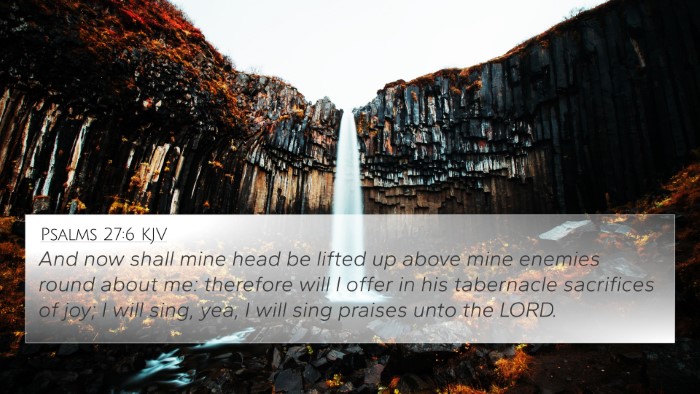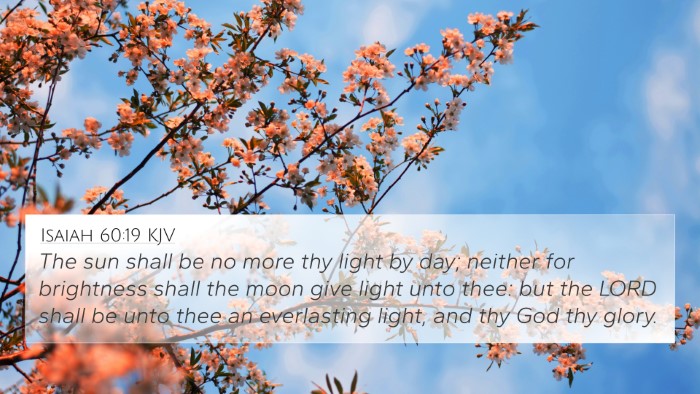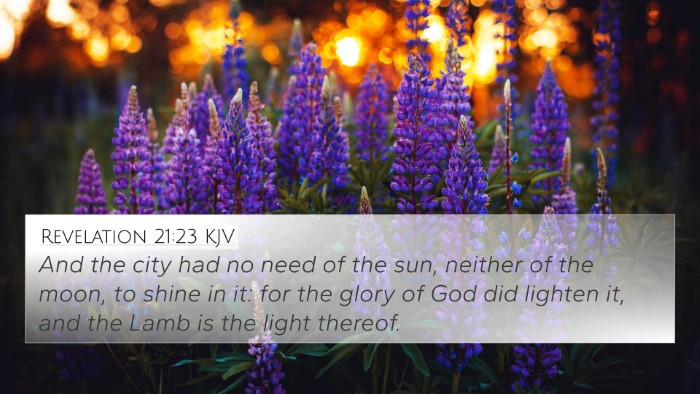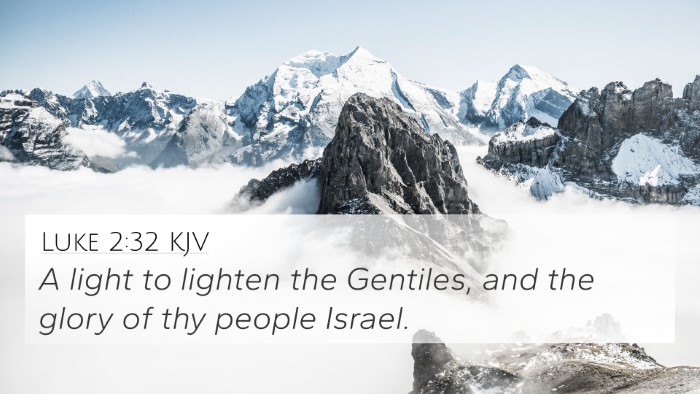Understanding Psalms 3:3
Psalms 3:3 states: "But thou, O Lord, art a shield for me; my glory, and the lifter up of mine head." This verse speaks volumes about God's protective nature, His role as our glory, and how He restores our confidence in times of distress. Below, we explore the insights from various public domain commentaries to deepen the understanding of this profound text.
Commentary Insights
- Matthew Henry: In his commentary, Henry emphasizes the notion of God as a shield, illustrating His protective presence in the life of a believer. He points out that this metaphor highlights safety from both physical and spiritual dangers. He further elaborates on how God’s glory is not only our hope but also a reflection of His character.
- Albert Barnes: Barnes focuses on the reassurance that God provides amidst adversities. He notes that being the 'lifter of the head' signifies restoration of dignity and hope after facing shame or defeat. This phrase encapsulates the transformation that God can enact in one’s life, turning despair into joy.
- Adam Clarke: Clarke comments on the intimate relationship that the psalmist portrays with God, referring to Him as a personal source of strength. He highlights the importance of recognizing God’s sovereignty and care, particularly in dangerous times, and how this awareness can empower a believer's faith.
Thematic Connections
This verse beautifully interweaves with several biblical themes and concepts, particularly God's protection, glory, and restoration. Below are some key connections with other scriptures:
- Psalm 18:30: "As for God, his way is perfect: the word of the Lord is tried: he is a buckler to all those that trust in him." This verse reflects the notion of God as a protector, resonating with the shield metaphor.
- Isaiah 54:17: "No weapon that is formed against thee shall prosper; and every tongue that shall rise against thee in judgment thou shalt condemn." This verse reassures the believer of divine protection against adversities.
- Philippians 4:7: "And the peace of God, which passeth all understanding, shall keep your hearts and minds through Christ Jesus." This aligns with the theme of God's protective peace being a shield for our hearts.
- 1 Peter 5:10: "But the God of all grace, who hath called us unto his eternal glory by Christ Jesus, after that ye have suffered a while, make you perfect, stablish, strengthen, settle you." This verse connects with restoration and glory found in God after trials.
- Psalm 30:5: "For his anger endureth but a moment; in his favour is life: weeping may endure for a night, but joy cometh in the morning." This reflects the lifter of the head concept, suggesting that God brings joy after sorrow.
- Hebrews 4:16: "Let us therefore come boldly unto the throne of grace, that we may obtain mercy, and find grace to help in time of need." Encourages believers to come to God for help and comfort.
- Romans 8:31: "What shall we then say to these things? If God be for us, who can be against us?" This powerful verse reassures that God's protective stance guarantees our safety and dignity.
Cross-Referencing and Bible Study Tools
For those seeking deeper understanding, employing cross-reference Bible study techniques can greatly enhance the exploration of related verses. Tools for Bible cross-referencing include:
- Bible concordance: A comprehensive index of words in the Bible, allowing for easy location of verses related to specific concepts.
- Bible cross-reference guide: A systematic method of tracing themes and connections between scripture passages.
- Cross-reference Bible study: Engaging in studies that illuminate the relationships between different verses enhances comprehension.
- Bible reference resources: Look for reliable texts and databases that provide extensive commentary and scripture connections.
Connecting Themes Across Scripture
Understanding Psalms 3:3 in the context of other Biblical texts exposes the rich tapestry of God’s promises and His nature as a protector and lifter of our heads. By identifying connections between Old and New Testament verses, such as the similarities between Psalms and teachings found in the Gospels, one can appreciate how themes of God’s glory and protection traverse the entire Bible.
Conclusion
The insights drawn from Psalms 3:3 reveal a portrait of a God who is both a shield and a source of glory for His people. As we engage in comparative Bible verse analysis and thematic connections, we deepen our understanding of the immense grace and restorative power inherent in God's character. By cross-referencing and exploring these themes, believers can find encouragement and strength from the interconnectedness of scripture.



















